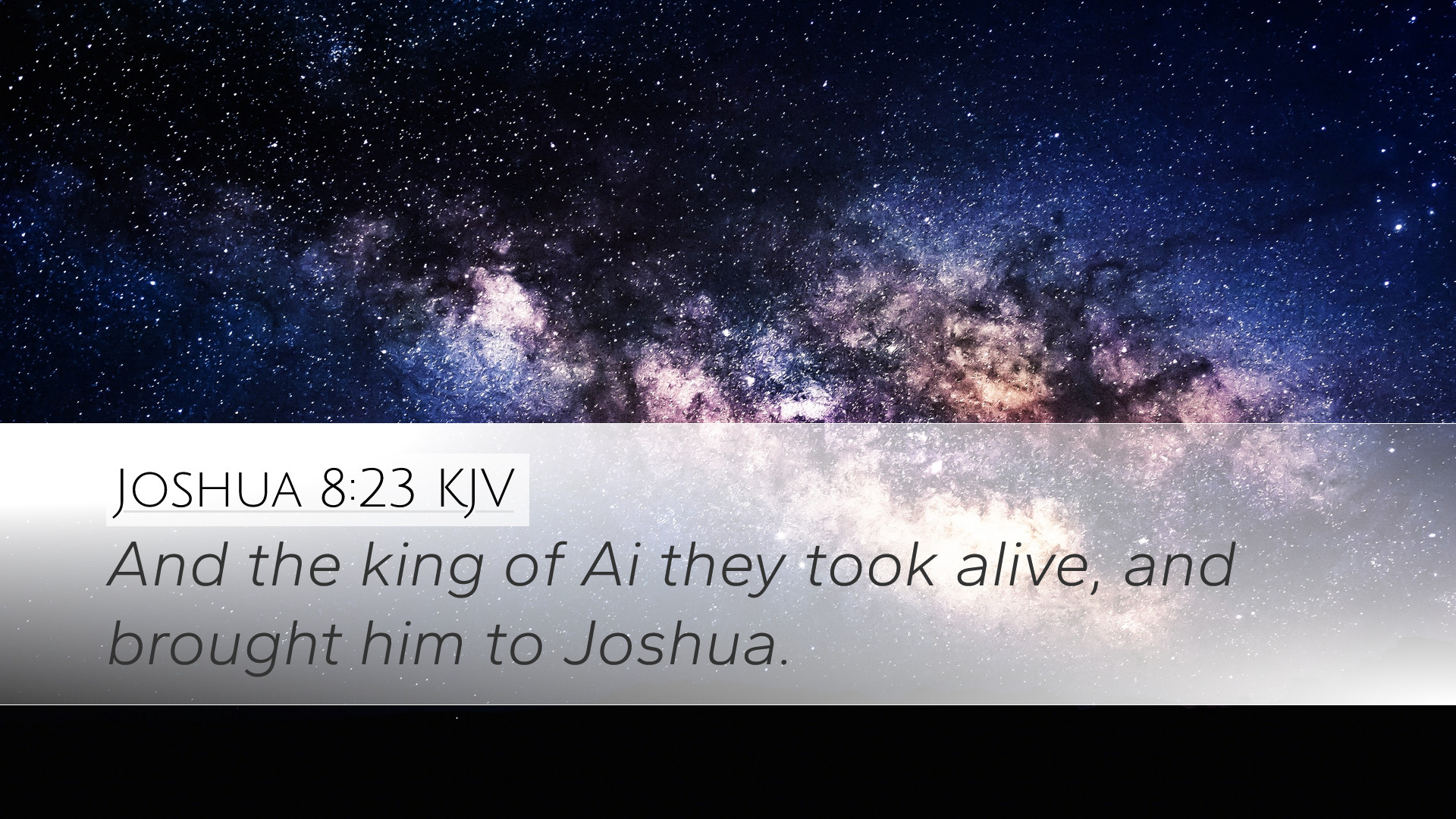Commentary on Joshua 8:23
Verse Context: Joshua 8:23 states, "But the king of Ai they took alive, and brought him to Joshua." This moment comes after the Israelites have successfully ambushed and taken the city of Ai, following their initial defeat due to Achan's sin. In this commentary, we will explore the significance of this verse from several public domain commentaries.
General Insights
This verse illustrates key themes of victory, justice, and fulfillment of God’s command. It encapsulates a pivotal moment where God's people, under the leadership of Joshua, decisively deal with the enemy in obedience to divine instructions. The fate of the king of Ai serves as a representation of the defeat of sin and opposition to God's will.
Historical Context
The capture of Ai stands as a critical point in Israel's conquest of Canaan. After experiencing humiliation and defeat due to Achan's sin (Joshua 7), the successful attack on Ai represents restoration and fidelity to God. The king of Ai, captured alive, reflects the shift from a defeated state to one of triumph.
Insights from Matthew Henry
Matthew Henry emphasizes that the capture of the king indicates God's absolute sovereignty over the nations and the futility of opposing His chosen people. The king, being taken alive, showcases not only the military triumph but also the embarrassment of the opposing leadership. Henry asserts that just as God dealt with Achan, He ensures that those who oppose His will ultimately face justice.
Insights from Adam Clarke
Adam Clarke points out the strategic significance of capturing the king of Ai. He remarks that keeping the king alive for presentation to Joshua serves to signify the complete subjugation of their enemies. Clarke notes that the capture would act as a potent symbol for the Israelites, reinforcing their morale as they witnessed the fruits of Yahweh's provision. Furthermore, he suggests that the capturing of rulers symbolizes God's dominion over worldly authorities.
Insights from Albert Barnes
Albert Barnes interprets the taking of the king of Ai alive as a demonstration of the fate awaiting all who rebel against God. He observes that it serves as a warning to others and stresses the idea of justice, as the captured king would face judgment for his actions against God's people. Barnes also notes that this act fulfills God's earlier commands regarding the treatment of captured leaders and serves to underline the seriousness with which God takes the affairs of His people.
Theological Implications
This verse not only reflects a historical account but carries significant theological implications. It suggests the overarching theme of divine justice and the ultimate sovereignty of God. The capture of Ai's king symbolizes God's power to bring low those who exalt themselves against Him.
Symbolism of the King
The king of Ai can be viewed as a representation of the sin and spiritual adversaries that believers face. In theological discourse, his capture serves to encourage believers to understand that all things must ultimately bow before God's authority. This moment serves as a reminder that trials and oppositions, represented by the kings of Ai, will ultimately lead to acknowledgment of God's supremacy.
Role of Leadership
The role of Joshua as the leader reflects the divine appointment of leaders within the church today. Just as Joshua led with confidence and obedience, contemporary leaders must rely on God for direction and support in their spiritual battles. Strengthened by prayer and guidance, they can lead their congregations toward triumph over adversity.
Application for Today
For pastors, students, and theologians, Joshua 8:23 offers rich insights into leadership, victory, and God's justice. Effective application of this passage encourages believers to trust in God's sovereignty even amidst trials. The capture of the king of Ai serves as a reminder that God is actively involved in the struggles and victories of His people.
- Leadership: Emphasizing God-given authority.
- Faithfulness: Illustrating the importance of obedience to God's commands.
- Justice: Assurance that God will enact judgment against sin and rebellion.
- Victory in Christ: Understanding the ultimate victory believers have through Christ's resurrection.
Conclusion
Joshua 8:23 serves as a crucial moment in the narrative of Israel's conquest of Canaan. The insights drawn from various public domain commentaries reveal layers of meaning related to divine justice, the power of leadership, and the assurance of God's victory over sin and opposition. Scholars and practitioners alike can glean these lessons to deepen their understanding and application of biblical principles in their lives and ministries.


